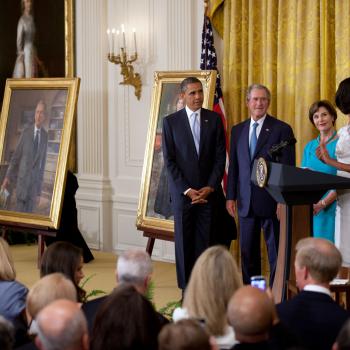This, of course, is the headline for those of us looking for a diversion from the events in France: “Obama to propose two free years of community college for students.”
The details: Obama proposes that the federal government cover 75% of the tuition costs, based on national averages, for the “first two years” of a student’s attendance at a community college, so long as the state agrees to pay the remainder of the cost (which presumably will vary based on whether the particular college is below, at, or above the average). Other proposed requirements: the student must attend at least half-time and must maintain a 2.5 GPA, and the college itself must
offer programs that are either 1) academic programs that fully transfer credits to local public four-year colleges and universities, or 2) occupational training programs with high graduation rates and lead to in-demand degrees and certificates. Community colleges must also adopt promising and evidence-based institutional reforms to improve student outcomes.
according to the White House website.
Now, what could go wrong?
In the first place, the feds would hold the purse strings and the demand for “institutional reforms” would give them substantial regulatory power. What happens when they decide that a particular community college doesn’t qualify? Of course, they’ll jump. And, around here, the community colleges each serve a specified district, and are supposed to be responsive to that district’s needs. But if the state is covering the remainder of the costs, would they really tolerate price differentials from one college to the next?
As to pricing, there’d be two tensions — the feds covering 75% of national-average tuition would tend to bump rates up. No one would want to be the sucker leaving federal money on the table. But I suppose the states would tend to push rates down, if they’re on the hook for the remainder. But if it’s the local college that sets the tuition, and it’s all free money, there may not be any limit to the tuition hikes.
And do any of the restrictions make much sense? An older student, taking one class at a time while working full-time, pays full price (which may end up being much inflated) while a fresh high school graduate attends free? And how would the “first two years” be measured for a student returning to college for additional education? And would all occupational training programs be covered, or only those that are “in-demand,” and who determines this?
As a side note, Obama says that the proposal is for “everybody who’s willing to work for it” which some commenters are assuming means some kind of community service requirement — but I think that’s just a reference to the requirement to maintain a 2.5 GPA (not hard to do, given that colleges generally let you drop classes in which you suspect you’re headed towards a grade lower than this).
But what mystifies me more than anything else is the political reasoning, or lack thereof, behind this.
Does Obama seriously think that Boehner and what’s his name in the Senate are going to embrace this proposal? Is this even a proposal, or is this just a set of talking points? And, again, he’s travelling, in this case to Tennessee (see here for a local report on the roads closing and schools dismissing early as a result), to give a speech announcing this initiative.
Unless he’s completely lost his mind, he’s got to recognize that this has to be implemented by legislation, that there isn’t any appetite for it, and there are currently multiple programs to provide funding at least sufficient for community college tuition, including Pell Grants (up to $5,730 based on financial need) and the Hope or American opportunity tax credits ($2,500, 40% refundable, the first $2,000 on first-dollar college costs).
Is he planning on submitting legislation to Congress? Or is this going to be nothing more than just another speech, soon forgotten about? And in what world is he going to get Congress to work with him by means of speech-making? (And heck, I’d say there’s at least an even chance that he uses the speech itself to criticize Congress.)
Now, look, I think that, in general, the a large portion of the sort of basic education that community colleges tend to provide — the mix of vocational classes and introductory courses to college topics, and a substantial dose of remedial education — ought to be handled at the secondary school level, open to all comers, rather than limiting offerings to traditional students, night school for older teenagers, and GED preparation for everyone else. I wrote about this about a year ago. But I hardly think that having the feds come in and hold the purse strings and ultimately control community colleges is the way to go.
In any event, if what we’ve got to look forward to is another two years of Obama making generous promises in one speech after the next, in one “middle America” locale after another, while vetoing anything Congress does, we’re in trouble.
Postscript: I’m looking at the twitter hashtag #FreeCommunityCollege now and it sure looks as if the expectation is not just free community college, but a program for free college in general, be it two or four year, or at least a proposal for “free” college anywhere, not just at the local “Only Chance College” (as we called it, back then).











